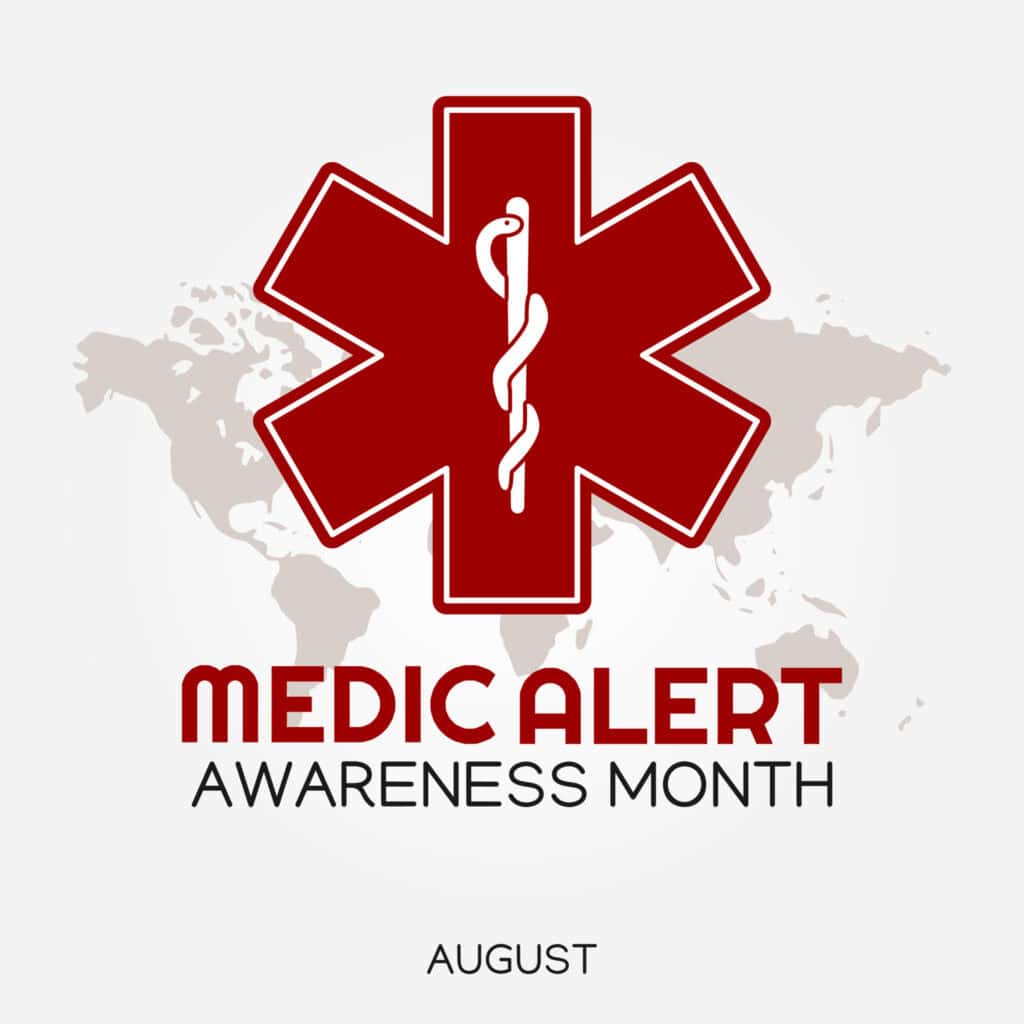Did you know that August is MedicAlert Awareness Month? When you hear the term “medic alert” you may think of the old ad with an older woman who’s fallen and can’t get up, but there’s so much more to MedicAlert devices. These devices can be a great way to remain independent while living alone or aging in place. They also offer peace of mind to loved ones and caregivers.
What are MedicAlert devices?
- MedicAlert IDs– Wearable jewelry (e.g., bracelets, necklaces) that are engraved with important medical information. These alert first responders if there is a life-threatening medical condition or allergy (e.g., penicillin). Medical IDs can act as your voice if you’re unconscious or otherwise unable to speak!
- MedicAlert Devices– Small, often-wearable devices that remain dormant until there is a fall or other medical event that alerts first responders and/or loved ones that there has been an emergency, and the wearer needs assistance. Some devices send out an alert automatically while others may have a button that the user needs to push.
Who Could Benefit from MedicAlert Devices?
- Individuals living with chronic conditions that could result in complications or medical emergencies.
- Individuals with life-threatening allergies.
- Older adults living alone who may be at risk for falling (or who live with medical conditions that increase their risk of falling).
- Individuals at risk of wandering (e.g., living with Dementia or Alzheimer’s Disease).
What do MedicAlert Devices Look Like?
You may picture large, clunky, medical-looking necklaces and bracelets when you picture MedicAlert IDs or systems, but MedicAlerts have come a long way. The best MedicAlert ID/system is one that you actually wear/use. Medical alert IDs come in a variety of styles, from traditional to jewelry that doesn’t look much different from everyday jewelry. Alert buttons for MedicAlert systems can be basic necklaces that you tuck under your shirt or a regular-looking necklace secretly housing the alert button! In fact, some smart watches and cell phones that you might use right now can be used as a fall detection device.
Electronics with Fall Detection
- Apple Watch- Available on Apple Watch SE, Series 4 or lates, Apple Watch Ultra and later. If your watch detects a “hard fall,” it will tap you on the wrist, sound an alarm and/or display an alert. You can then decide whether to automatically contact emergency services or dismiss the alert. Click here to learn more.
- iPhone- All models after iPhone 14 have built-in fall detection notifications to emergency SOS vis satellite. Click here to learn more.
- Samsung Galaxy Watch- Available on Galaxy Watch Active2, Galaxy Watch3, and all Wear OS models. If your watch detects a “hard fall” it will immediately contact your emergency contacts. Click here to learn more.
Tips for Choosing a MedicAlert Device
- Check to see whether the device/system you’re looking at charges monthly fees.
- Check to make sure the device/system offers 24/7 emergency monitoring.
- How to Choose a Medical Alert System via AARP (article is from 2021).
- How To Choose a Medical Alert System via U.S. News & World Report.
Free Printable Wallet Cards (these are a good tool to use alongside MedicAlert IDs. You can add verbiage like “check wallet for medical information.”)
- Your emergency medical card via Michigan.gov
- Free emergency wallet card program via American Medical ID (Use code MYFREEWC at Checkout)
- Free custom medical alert wallet card via Lauren’s Hope
Local Providers
- MedicAlert Foundation offers free medical IDs and 1 year Safe & Found membership.
- Check your long-term care policy’s summary of benefits and coverage.
- If you have Medicare Part C/Medicare Advantage, you might have coverage for a MedicAlert Device (it may be called a medical alert system, personal emergency response system, or PERS).
- If you have Medicaid, you might have coverage for a MedicAlert device (it may be called a medical alert system, personal emergency response system, or PERS).
- The US Department of Veterans Affairs may cover a MedicAlert device or medical alert system. Call your local office for more information.
- AARP members qualify for discounts on MedicAlert devices (15% off monthly Lifeline services, free shipping, and free activation).
- MedicAlert + Alzheimer’s Association Safe Return Program- If an individual with Alzheimer’s Disease or Dementia wanders, caregivers can call MedicAlert’s 24/7 Emergency Response Team. The team will then activate the Safe and Found Services and create a missing person report. Click here for more information.
- Smart Medical ID Card via MedicAlert Foundation ($10).






